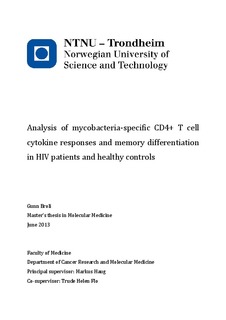| dc.description.abstract | Among people living with HIV/AIDS, tuberculosis caused by Mycobacterium tuberculosis (MTB) is the main cause of mortality with 430 000 deaths in 2011. Multidrug-resistant tuberculosis is on the rise, and no effective vaccine is available.
HIV causes a depletion of CD4+ T helper cells, a cell subset that is of central importance in controlling mycobacterial infections. Although initiation of highly active antiretroviral therapy (HAART) in HIV patients results in increased CD4+ T cell counts, HIV patients still show, after treatment, increased susceptibility to mycobacterial infections. For unknown reasons, anti-mycobacterial T cell functions seem to be impaired in HIV patients despite onset of therapy. We hypothesize that in HIV patients the (poly)functionality of anti-mycobacterial CD4+ T cell responses as well as the memory T cell composition might be altered compared to healthy control subjects.
In this study we therefore established and applied methods to investigate anti-mycobacterial CD4+ T cell effector functions and memory T cell subsets from peripheral blood mononuclear cells (PBMCs) of HIV infected individuals and healthy controls. Although freshly isolated PBMC were of superior quality, cells were found to retain their cytokine-producing abilities if stored in liquid nitrogen but not at -80 °C. Isolated PBMCs were stimulated with antigens from Mycobacterium tuberculosis as well as Mycobacterium avium overnight. The next day the cells were analyzed by flow cytometry using a protocol with up to 11 colours per sample to simultaneously examine CD4+ T cell effector functions and memory T cell phenotype. Effector cytokine production was also analyzed by ELISA and real-time PCR.
We first examined the polyfunctionality of CD4+ T cells, which is the ability of T cells to respond to antigen-stimulation with simultaneous production of several T cell effector cytokines. Production of TNF, IL-2 and IFN-γ from CD4+ T cells was thus analyzed by flow cytometry.
Different memory T cell subsets in the total as well as the mycobacteria-specific (cytokine-producing) T cell population were next identified by flow cytometric staining with the markers CD27, CD28, CD45RO, CD57, HLA-DR, PD-1 and CCR7.
With the chosen study protocol we analyzed so far samples of five healthy controls and seven HIV patients. Our preliminary findings show that a low number of CD4+ T cells produce mycobacteria-specific effector cytokines in response to M.tuberculosis and M.avium antigens both in healthy individuals and HIV patients. The degree of polyfunctionality was lower in HIV patients; cells simultaneously producing all three cytokines of interest was almost absent from this group.
For memory T cell phenotyping there were no obvious differences for most markers when considering the total CD4+ T cell population, except a higher proportion of HLA-DR and PD-1 in HIV patients than in healthy donors. When the simultaneous expression of CD27 and CCR7 was analyzed, findings point to that the mycobacteria-specific CD4+ T cells of healthy individuals are late differentiated, at a stage where expression of both CD27 and CCR7 are lost. Mycobacteria-specific CD4+ T cells of HIV patients seem to be of an earlier differentiated memory phenotype, as cells expressing both CD27 and CCR7 are predominant.
In summary, we have established a study design to analyze mycobacteria-specific CD4+ T cells and memory T cells in blood samples from healthy individuals and HIV patients. A limited number of HIV patients and healthy control samples were analyzed and yielded some promising preliminary results. In the future, the protocol from this project will be used to analyze polyfunctional T cell responses against M.avium and M.tuberculosis as well as memory T cell composition in a larger cohort of HIV patients visiting the outdoor clinic at St. Olavs Hospital. | nb_NO |
